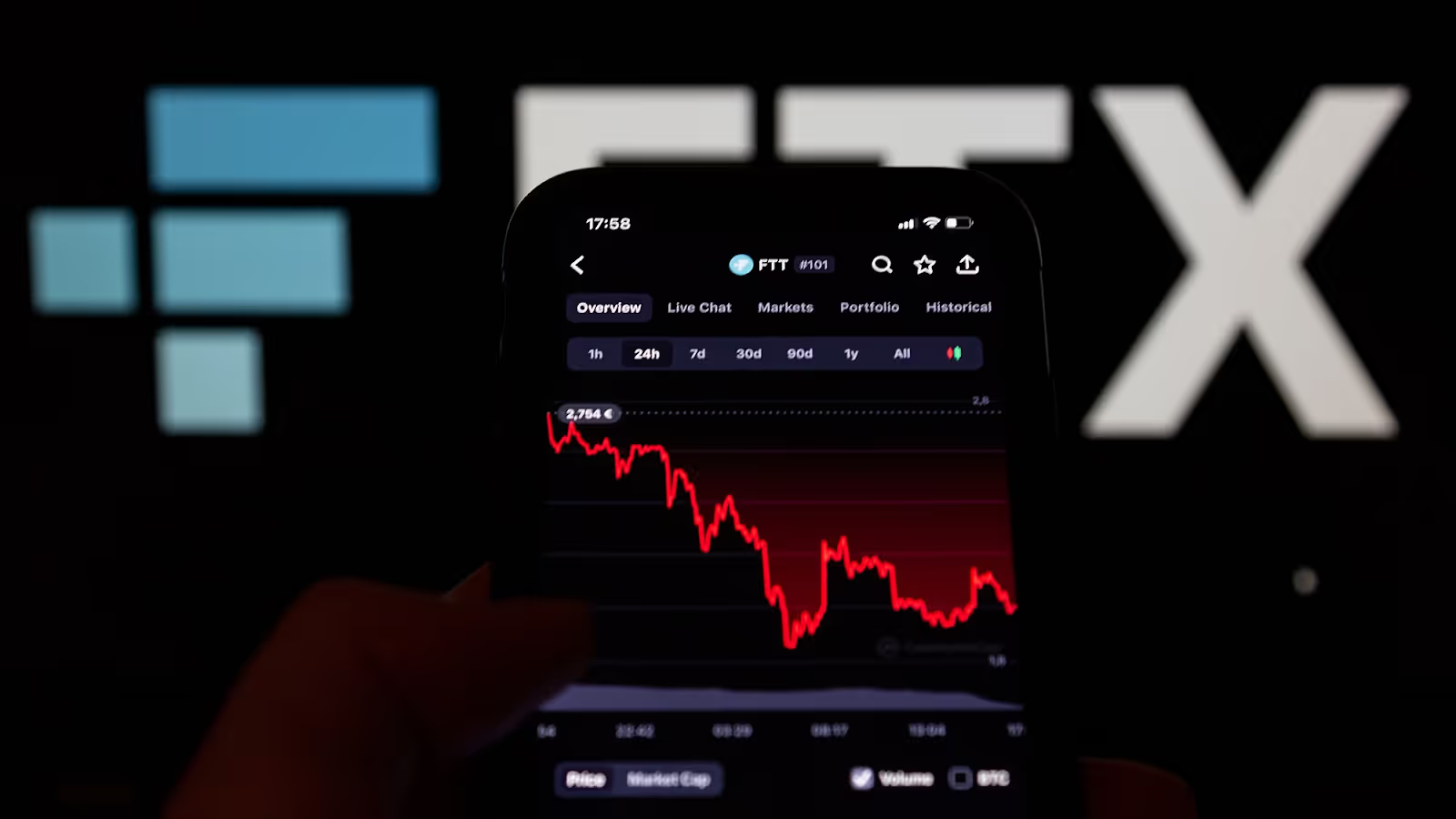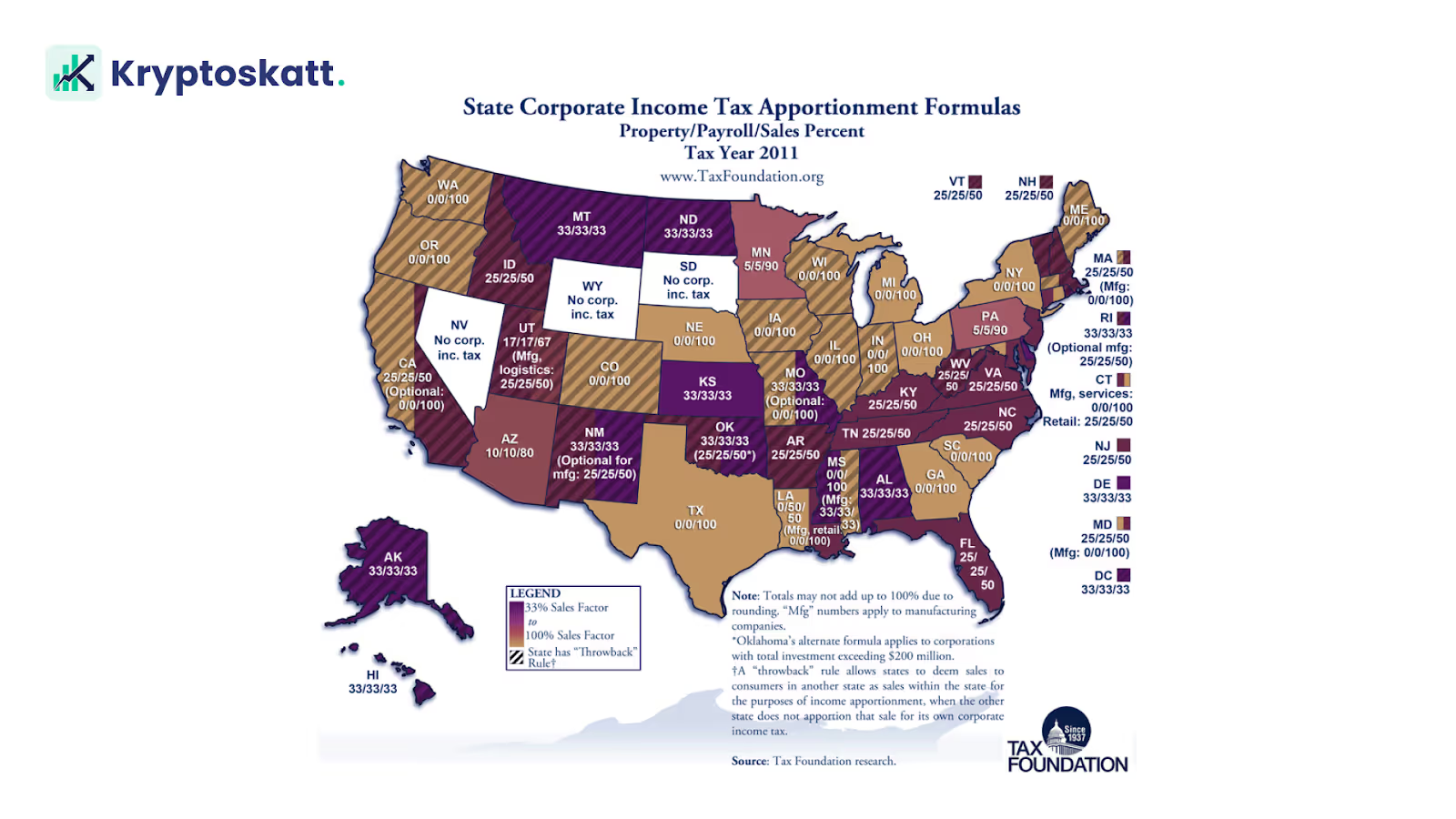.avif)
Calculate Your Crypto
Taxes in Minutes

The IRS has issued clear US crypto taxation guidelines and intends to make crypto tax filing convenient for US residents. However, many states are yet to release any specific guidelines concerning the nature of taxes, specifically income tax and sale and use tax.
Our objective today is to give you a thorough understanding of how different states in the US tax crypto and what are the implications of using crypto as a currency across the states of the US. But before we hop into it, here’s a quick recap of how the IRS treat crypto for federal tax purposes.
Key Crypto Terms (as defined by the IRS)
Virtual Currency
The IRS considers crypto to be a form of virtual currency and it defines it as follows:
“...a digital representation of value that functions as a medium of exchange, a unit of account, and a store of value other than a representation of the United States dollar or a foreign currency.”

The following can be categorised as virtual currency according to the IRS:
- Convertible crypto assets and currencies
- NFTs
- Stablecoins
Any form of virtual currency that is not backed by a physical asset like gold, or silver and acts as a substitute for real currency in any transaction is categorized as a convertible crypto asset.
Cryptocurrency
A cryptocurrency is again a form of convertible crypto asset that can be:
- Used to buy a product or service
- Swapped for some other type of asset
- Transferred between users via digital wallets
According to Notice 2014-21, the IRS defines cryptocurrency as:
“... a type of virtual currency that uses cryptography to secure transactions that are digitally recorded on a distributed ledger, such as a blockchain. A transaction involving cryptocurrency that is recorded on a distributed ledger is referred to as an “on-chain” transaction; a transaction that is not recorded on the distributed ledger is referred to as an “off-chain” transaction.”
Tangible Personal Asset
Tangible personal property is an asset class that exists in the real world unlike stocks, bonds, and patents and it is also completely different from real-estate assets like land, buildings, or apartment units.

The following assets are considered tangible personal assets by the IRS:
- Artwork
- Antiquities
- Furniture
- Collectables
- Heavy Machinery and Equipment
Crypto Mining
Crypto mining is the process by which new crypto tokens enter circulation. It’s the equivalent of printing new fiat currency. Crypto mining involves validating ledger transactions on a blockchain using powerful computers for which the miners are rewarded with new tokens.
Recent Events That Have Reshaped the Crypto Landscape
Crypto prices have been in a down swirl due to a mix of bad economic conditions and certain high-profile events in the crypto space. For instance, the Terralabs collapse that led to the first ever stablecoin losing its dollar peg or the FTX collapse that wiped out billions of dollars of investors’ money.

According to the official complaint filed by the SEC, FTX’s founder Sam Bankman-Fried was involved in the misuse of investor funds and loaned investors’ funds to Alameda(FTS’s sister company) and was therefore involved in fraud.
This was one of the biggest scams in the history of crypto and had severe repercussions in terms of the market. At the time of drafting this blog, Bitcoin and Ethereum are down 55.8% and 58.33% respectively and the price has been hovering in that range for over a year now. The market is showing some signs of recovery with Bitcoin crossing the $30,000 mark after almost a year, but any favourable deductions about the market are subject to crisis aversion.
State-Specific Guidance on Crypto Income Taxes
Fortunately for you, most states treat crypto the same way IRS does when it comes to taxes. States don’t consider crypto to be a form of currency, but instead, treat it as a capital asset (more like a property) and therefore when you go on and sell or exchange your crypto you attract tax liabilities. If you sell or exchange your crypto and receive something with more monetary value than your cost basis, you pay capital gains or income tax on the difference.
However, not all states have released clear guidelines regarding the taxation of crypto assets and there’s a still lot of confusion regarding how most states treat crypto. Here’s a list of all the states that have clear tax guidelines around crypto transactions:
- Wisconsin
- New York
- New Jersey
- Illinois
- Michigan
We’ve discussed the tax rules from these states in detail in later sections of the blog.
The Concept of Apportionment and How It Affects Virtual/Cryptocurrency Taxation
Apportionment is the process of dividing and allocating taxes or tax liabilities among different jurisdictions based on a formula or method. This is typically done when a taxpayer has activities or operations in multiple jurisdictions, such as when a business operates in several states or countries.
In the US, each state has its own set of tax laws and regulations, and they use different methods for apportioning taxes among taxpayers who have operations or activities in multiple states. One common method used by many states is the three-factor formula, which takes into account the percentage of sales, property, and payroll that are attributable to each state.

When a business operates in multiple states, each state has its method for dividing the tax liability among the different states. The most common method is a "three-factor formula" that takes into account the percentage of sales, property, and payroll that occur in each state.
For example, let's say a business operates in three states, with 50% of its sales occurring in State A, 30% in State B, and 20% in State C. The business has 40% of its property and 60% of its payroll in State A, 30% of its property and 20% of its payroll in State B, and 30% of its property and 20% of its payroll in State C.
Using the three-factor formula, each state would calculate the percentage of the business's tax liability that should be apportioned to that state based on the rate of sales, property, and payroll that occur in that state. The specific formula and weights used can vary by state and industry.
So, here, State A might apportion 50% of the tax liability to its operations, State B might apportion 30%, and State C might apportion 20%.
State-Specific Sales and Use Tax
Sales tax is levied on end users and consumers of a product or service and is added to the cost and charged at the time of purchase, while use tax is a self-assessed tax charged from consumers and businesses when they buy a product/service manufactured or procured outside the state boundary. But the products and services we are talking about are usually tangible and crypto assets are intangible assets and therefore solicit some practical questions:
What if I buy a tangible product or service using crypto assets, does that attract Sales and Use tax?
What about digital products like audio files, video files, digital art, and NFTs etc, how do state tax authorities view these transactions from a tax perspective?
And to be honest very few states have come out openly and issued guidelines regarding how sales and use tax will be levied on crypto transactions. Some of the states that have issued clear guidelines on sales and use taxations of crypto are:
- Kansas
- California
- Kentucky
- Minnesota
- Michigan
- New Jersey
- New York
- Missouri
- Tennessee
- Wisconsin
- Washington
You can click on the state and it will take you directly to the state tax authorities’ official website and you can review the sales and use tax guidelines yourself for every state.
Here are some of the US states where crypto transactions are exempt from sales and use tax:
- New Hampshire
- Oregon
- Montana
- Alaska
- Delaware
Let’s visit some sales and use tax guidelines for some tax in a little more detail to make things clearer.
Kentucky State Crypto Sales and Use Tax
The sale of cryptocurrency is generally not subject to Kentucky sales tax. This is because Kentucky law only imposes a sales tax on the sale of tangible personal property, and cryptocurrency is not considered tangible personal property. Kentucky law requires that individuals and businesses pay use tax on any tangible personal property purchased outside of the state and brought into Kentucky for use, storage, or consumption. This includes cryptocurrency purchased from an out-of-state seller.
Kentucky offers a sales and uses tax benefit aimed at encouraging the purchase of tangible personal property for constructing, retrofitting, or upgrading commercial cryptocurrency mining facilities. This benefit allows for reimbursement of up to 100% of the sales and uses tax paid on eligible project purchases, serving as an incentive for businesses looking to invest in the industry.
Minnesota State Crypto Sales and Use Tax
Minnesota state levies sales and uses a tax on NFTs because they can be used to digitize real-world tangible assets and facilitate their sale and transfer. With NFTs purchasers can have access to:
- Digital art
- Concert tickets
- Coupons for food and beverages
- Tangible property such as real estate
California State Crypto Sales and Use Tax
Cryptocurrency transactions do not attract sales and use tax in California because according to the state sales and use tax guidelines, only the sale of tangible personal property attracts sales and use tax, and since crypto is not considered to be tangible personal property, it doesn’t attract any tax liabilities unless a real tangible asset as exchanges hands in the backdrop.
New York State Crypto Sales and Use Tax
- In New York, using virtual currency to pay for goods or services is treated as a barter transaction.
- Convertible cryptocurrency is considered intangible property in New York and is not subject to sales tax.
- However, if a party receives convertible cryptocurrency in exchange for goods or services that are subject to sales tax, they owe sales tax based on the market value of the cryptocurrency at the time of the transaction.
- If a party trades property or services for convertible cryptocurrency and provides a sales slip, invoice, or receipt, they must separately state the sales tax due in U.S. dollars on the document.
FAQs
1. If I receive cryptocurrency as payment for goods or services, do I need to report it as income on my state tax return?
Yes, if you receive cryptocurrency as payment for goods or services, you generally need to report it as income on your state tax return. In the United States, the Internal Revenue Service (IRS) considers cryptocurrency as property for tax purposes, and any income earned from the sale or exchange of cryptocurrency is generally subject to federal and state income tax.
The value of the cryptocurrency at the time of receipt is used to determine the amount of income you received, and it should be reported on your state tax return accordingly. It's important to keep accurate records of your cryptocurrency transactions to properly report your income and ensure compliance with state tax laws.
2. Can states impose their regulations on cryptocurrency transactions, or is it solely governed by federal law?
Cryptocurrency regulation is a relatively new and evolving area of law, and there is no clear answer as to whether states can impose their regulations on cryptocurrency transactions.
Currently, there is no federal law that specifically regulates cryptocurrencies, but federal agencies such as the Securities and Exchange Commission (SEC) and the Commodity Futures Trading Commission (CFTC) have issued guidance on the application of existing federal securities and commodities laws to cryptocurrencies.
Many states have taken steps to regulate cryptocurrencies, such as requiring virtual currency businesses to obtain licenses and imposing consumer protection measures. However, the extent to which states can regulate cryptocurrency transactions may depend on whether these regulations conflict with federal laws or implicate interstate commerce.
3. Are there any states that offer tax incentives for cryptocurrency mining facilities?
Yes, some states offer tax incentives for cryptocurrency mining facilities. One example is Kentucky, which provides sales and uses tax incentives for commercial cryptocurrency mining facility purchases. This incentive provides up to 100% of the sales and uses tax paid on purchases of tangible personal property to construct, retrofit, or upgrade an eligible project.
Other states like Texas and Wyoming, have also introduced legislation to attract cryptocurrency mining operations by offering tax incentives, low energy costs, and other benefits.
4. Is cryptocurrency subject to sales tax in all states?
No, cryptocurrency is not subject to sales tax in all states in the United States. The tax treatment of cryptocurrency transactions varies by state, and some states have issued guidance on sales and use tax laws.
For example, New York State treats cryptocurrency as intangible property, and the purchase or use of the intangible property is not subject to sales tax. However, if the party that gives cryptocurrency in trade receives in exchange goods or services that are subject to sales tax, that party may owe sales tax based on the market value of the cryptocurrency at the time of the transaction, converted to U.S. dollars.
All content on Kryptos serves general informational purposes only. It's not intended to replace any professional advice from licensed accountants, attorneys, or certified financial and tax professionals. The information is completed to the best of our knowledge and we at Kryptos do not claim either correctness or accuracy of the same. Before taking any tax position / stance, you should always consider seeking independent legal, financial, taxation or other advice from the professionals. Kryptos is not liable for any loss caused from the use of, or by placing reliance on, the information on this website. Kryptos disclaims any responsibility for the accuracy or adequacy of any positions taken by you in your tax returns. Thank you for being part of our community, and we're excited to continue guiding you on your crypto journey!
| Step | Form | Purpose | Action |
|---|---|---|---|
| 1 | 1099-DA | Reports digital asset sales or exchanges | Use to fill out Form 8949. |
| 2 | Form 1099-MISC | Reports miscellaneous crypto income | Use to fill out Schedule 1 or C. |
| 3 | Form 8949 | Details individual transactions | List each transaction here. |
| 4 | Schedule D | Summarizes capital gains/losses | Transfer totals from Form 8949. |
| 5 | Schedule 1 | Reports miscellaneous income | Include miscellaneous income (if not self-employment). |
| 6 | Schedule C | Reports self-employment income | Include self-employment income and expenses. |
| 7 | Form W-2 | Reports wages (if paid in Bitcoin) | Include wages in total income. |
| 8 | Form 1040 | Primary tax return | Summarize all income, deductions, and tax owed. |
| Date | Event/Requirement |
|---|---|
| January 1, 2025 | Brokers begin tracking and reporting digital asset transactions. |
| February 2026 | Brokers issue Form 1099-DA for the 2025 tax year to taxpayers. |
| April 15, 2026 | Deadline for taxpayers to file their 2025 tax returns with IRS data. |
| Timeline Event | Description |
|---|---|
| Before January 1, 2025 | Taxpayers must identify wallets and accounts containing digital assets and document unused basis. |
| January 1, 2025 | Snapshot date for confirming remaining digital assets in wallets and accounts. |
| March 2025 | Brokers begin issuing Form 1099-DA, reflecting a wallet-specific basis. |
| Before Filing 2025 Tax Returns | Taxpayers must finalize their Safe Harbor Allocation to ensure compliance and avoid penalties. |
| Feature | Use Case Scenario | Technical Details |
|---|---|---|
| Automated Monitoring of Transactions | Alice uses staking on Ethereum 2.0 and yield farming on Uniswap. Kryptos automates tracking of her staking rewards and LP tokens across platforms. | Integrates with Ethereum and Uniswap APIs for real-time tracking and monitoring of transactions. |
| Comprehensive Data Collection | Bob switches between liquidity pools and staking protocols. Kryptos aggregates all transactions, including historical data. | Pulls and consolidates data from multiple sources and supports historical data imports. |
| Advanced Tax Categorization | Carol earns from staking Polkadot and yield farming on Aave. Kryptos categorizes her rewards as ordinary income and investment income. | Uses jurisdiction-specific rules to categorize rewards and guarantee compliance with local tax regulations. |
| Dynamic FMV Calculation | Dave redeems LP tokens for Ethereum and stablecoins. Kryptos calculates the fair market value (FMV) at redemption and during sales. | Updates FMV based on market data and accurately calculates capital gains for transactions. |
| Handling Complex DeFi Transactions | Eve engages in multi-step DeFi transactions. Kryptos tracks value changes and tax implications throughout these processes. | Manages multi-step transactions, including swaps and staking, for comprehensive tax reporting. |
| Real-Time Alerts and Updates | Frank receives alerts on contemporary tax regulations affecting DeFi. Kryptos keeps him updated on relevant changes in tax laws. | Observe regulatory updates and provide real-time alerts about changes in tax regulations. |
| Seamless Tax Reporting Integration | Grace files taxes using TurboTax. Kryptos integrates with TurboTax to import staking and yield farming data easily. | Direct integration with tax software like TurboTax for smooth data import and multi-jurisdictional reporting. |
| Investor Type | Impact of Crypto Tax Updates 2025 |
|---|---|
| Retail Investors | Standardized crypto reporting regulations make tax filing easier, but increased IRS visibility raises the risk of audits. |
| Traders & HFT Users | To ensure crypto tax compliance, the IRS is increasing its scrutiny and requiring precise cost-basis calculations across several exchanges. |
| Defi & Staking Participants | The regulations for reporting crypto transactions for staking rewards, lending, and governance tokens are unclear, and there is a lack of standardization for decentralized platforms. |
| NFT Creators & Buyers | Confusion over crypto capital gains tax in 2025, including the taxation of NFT flips, royalties, and transactions across several blockchains. |
| Crypto Payments & Businesses | Merchants who take Bitcoin, USDC, and other digital assets must track crypto capital gains for each transaction, which increases crypto tax compliance requirements. |
| Event | Consequences | Penalties |
|---|---|---|
| Reporting Failure | The tax authorities can mark uncontrolled revenues and further investigate. | Penalty fines, interest on unpaid taxes and potential fraud fees if they are deliberately occurring. |
| Misreporting CGT | Misreporting CGT Error reporting profits or losses can trigger the IRS audit. | 20% fine on under -ported zodiac signs, as well as tax and interest. |
| Using decentralized exchanges (DEXs) or mixers without records | The IRS can track anonymous transactions and demand documentation. | Possible tax evasion fee and significant fine. |
| Disregarding Bitcoin mining tax liabilities | Mining reward is considered taxable income, and failure of the report can be regarded as tax fraud. | Further tax obligations, punishment and potential legal steps. |
| Foreign crypto holdings: Non-disclosure | Foreign-accepted crypto FATCA may be subject to reporting rules. | Heavy fines (up to $ 10,000 per fracture) or prosecution for intentional non-transport. |
File Your Crypto Tax in Minutes










